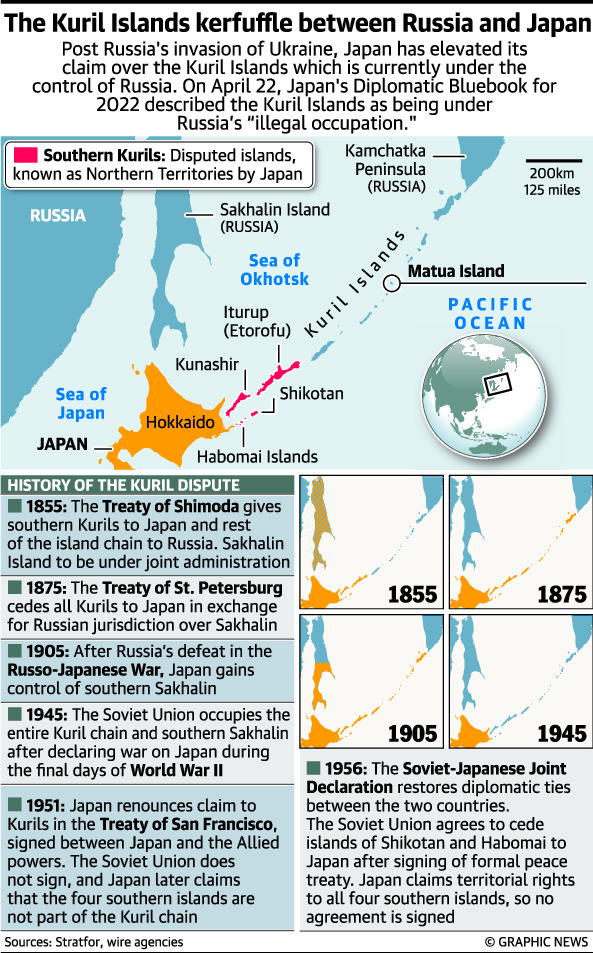Published on: April 26, 2022

KURIL ISLANDS DISPUTE
KURIL ISLANDS DISPUTE

BACKGROUND
- The Russian invasion of Ukraine seems to have brought to the forefront some other disputes that Russia has with the West’s allies
- On April 22, Japan’s Diplomatic Bluebook for 2022 described the Kuril Islands (which Japan calls the Northern Territories and Russia as the South Kurils) as being under Russia’s “illegal occupation”
- Japan had been using softer language since 2003, saying that the dispute over the islands was the greatest concern in Russia-Japan bilateral ties
KURIL ISLANDS – GEOGRAPHY
- Chain of islands stretching from theJapanese island of Hokkaido to the southern tip of Russia’s Kamchatka Peninsula
- Separate the Okhotsk Sea from the North Pacific Ocean
- Consists of 56 islands and minor rocks
- The islands are part of the Ring of Fire belt of geologic instability circling the Pacific.
- It contains at least 100 volcanoes, of which 35 are still active, and many hot springs.
- Earthquakes and tidal waves are common phenomena over these islands.
THE DISPUTE
- The dispute is concerning four islands which are:
- Iturup or Etorofu Island
- Kunashir or Kunashiri Island
- Shikotan Island
- Habomai Island
- Both Moscow and Tokyo claim sovereignty over them though the islands have been under Russian control since the end of World War II
- The Soviet Union had seized the islands at the end of World War II and by 1949 had expelled its Japanese residents
- Tokyo claims that the disputed islands have been part of Japan since the early 19th century
AGREEMENTS BETWEEN JAPAN AND RUSSIA OVER THE KURIL ISLANDS
Treaty of Shimoda – The 1855 Treaty of Shimoda, which established diplomatic relations between Russia and Japan, was the first Russo-Japanese accord to deal with the status of Sakhalin and the Kuril Islands. (1855)
Treaty of Saint Petersburg (1875)
- Russia gave Japan possession of the Kurils in exchange for undisputed control of Sakhalin Island in the Treaty of Saint Petersburg, signed between the two countries in 1875.
- For Russia, the Russo-Japanese War of 1904–5 was a military failure. The Treaty of Portsmouth, signed at the end of the war in 1905, awarded Japan the southern half of Sakhalin Island.
- During World War II, Japan was a German ally, and the USSR was aware of this. Later on, however, Soviet and Japanese troops were on opposing sides.
Yalta Agreement (1945) – The islands were given to the Soviet Union in 1945 as part of the Yalta negotiations (which were codified in the 1951 Treaty of Peace with Japan), and the Japanese population was returned and replaced by the Soviets.
San Francisco Peace Treaty, 1951
- The Allies and Japan signed this treaty in 1951, which declared that Japan must relinquish all rights, titles, and claims to the Kuril Islands while simultaneously refusing to recognize the Soviet Union’s authority over them.
- Following World War II, the following two treaties further exacerbated the situation, resulting in modern-day Kuril Island disputes.
Japan-Soviet Joint Declaration (1956)
- The Japan-Soviet Joint Declaration restored diplomatic relations between Japan and Russia in 1956.
- The Soviet Union offered that the conflict is settled by returning Shikotan and Habomai to Japan during the 1956 peace talks between Japan and the Soviet Union.
- This was accepted by Japan, and the statement officially ended the conflict between the two countries. However, the Kuril Islands conflict lingered in the shape of territorial interpretation.
WHAT MAY HAPPPEN NEXT
- Soon after the Russian invasion of Ukraine, Japan made its unhappiness with Russia clear with its Foreign Minister Hideki Uyama, saying that Russia had “occupied” the southern part of the Kuril Islands, thereby violating international law.
- Japan has been among the most steadfast of Western allies in denouncing Russian aggression and punishing it with sanctions. The April 22 statement in its Diplomatic Bluebook will further damage relations between the two countries. Japan has probably been spurred by its fears of a Russia-China alliance as Japan itself has territorial disputes and an uneasy history with China.
- Secondly, Japan might have felt that this is a good opportunity to further isolate Russia and paint it as a “habitual offender” of international law.
- Finally, Tokyo might have been prompted to take this position as it feels that the invasion of Ukraine proves that getting back the Kuril Islands is a lost cause.
- Japan’s policy shift on the Kuril Islands will only embitter bilateral relations with Russia while advancing the possibility of its two neighbours, China and Russia, coming together against it.

